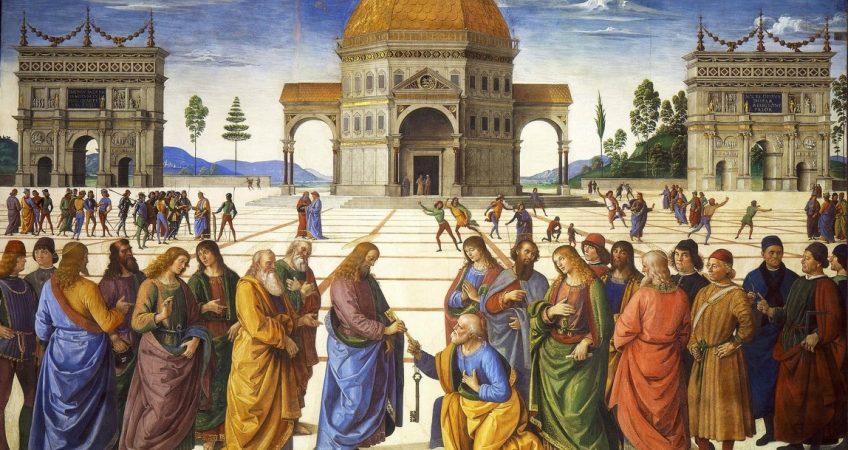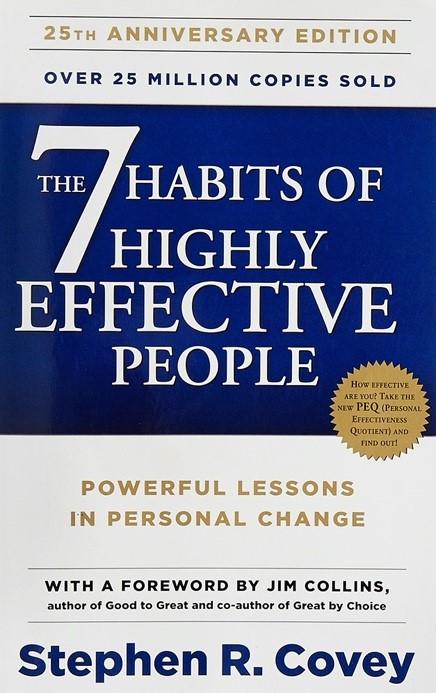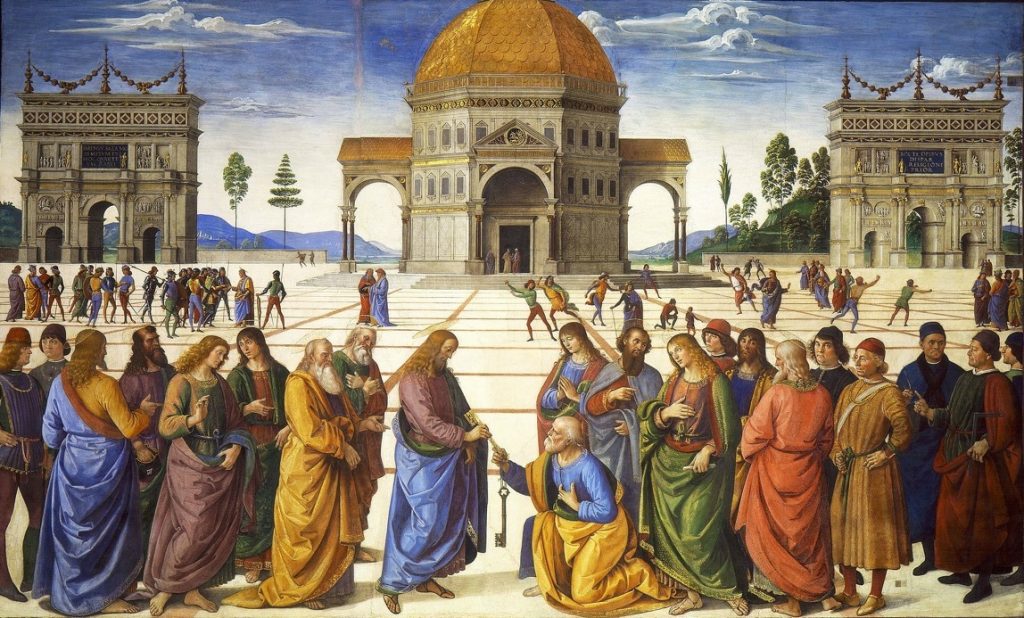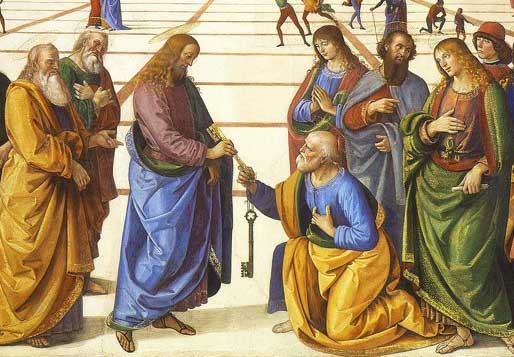HOMILY FOR MASS FOR 21ST SUNDAY ORDINARY TIME, YEAR A

St. Mary’s Basilica, Sydney, 23 August 2020

In his international best-seller, The 7 Habits of Highly Effective People, Stephen Covey argues that there are three stages of maturity: dependence, independence, and interdependence.[1] Together these three form what he calls ‘the maturity continuum’.
Put simply, dependence is the you paradigm, meaning you are to blame, not me. It’s someone else’s responsibility to look after me. It’s your job to build me up, guide and enable me. It’s your fault if I fail, am unhappy or wicked. And so on – you get the picture. This might seem like five-year-old thinking, but some fifty-year-olds think this way too. They blame the Devil or their upbringing or the government or community, anyone but themselves when things don’t go right for them, and they remain comfortably dependent on the ‘Nanny state’ or others all their lives.
Moving along the maturity continuum, we arrive at independence, the me paradigm: it’s my responsibility to invent myself, pick my own values, make my own choices, look after No. 1. While I can still rely on others to take some care of me, I am now increasingly self-sufficient. And that sense of personal responsibility can become so dominant that ‘I did it my way’ is our theme-song. Individualism is powerful in our culture and economy. But if Covey is right, the move from dependence to independence is not the end of maturation.

One more stage remains, that of interdependence, the we paradigm. Life is not only about you looking after me or me looking after No. 1; it’s also about our caring for each other. Many of our personal beliefs and ideals are in fact shared, and our characters and aspirations greatly influenced by others. Whatever our personal bucket list, many goals and projects are joint ones too. While remaining dependent on others in some ways and independent in others, in this third stage we acknowledge that we are interconnected and only flourish in the context of various communities.

Perugino, The delivery of the keys to Peter
Our Gospel this morning (Mt 16:13-20) intimates such a maturity continuum for Christian disciples. Our Lord begins by asking His disciples who other people say He is. He gets various answers. “They say you’re JB or Elijah.” “Some think you’re Jeremiah or another prophet.” Fair enough: much of what we believe we’ve received from others, not just in religion but in science, history, law and the rest. Particularly as children, but even as adults, we accept a lot on authority, on the basis of someone else’s say-so.
At this point Jesus could have praised them for being good citizens or receptive students, for respecting the right authorities and quoting the best texts. But what ‘they say’ isn’t enough. It’s just background to what He asks next: ‘Who do you say I am?’ Our commitment to Him, to faith and ideals, has to be personal, be our own. Immediately after this homily we will not recite a creed that says “My ancestors believed in one God… my family believes in God the Father Almighty… my wife believes in one Lord Jesus Christ… a remnant of my society believes in the Holy Spirit… my priest believes in the holy Catholic Church”. No, we profess our own faith: I believe in One God, Ibelieve in the Father Almighty, Ibelieve in the Lord Jesus Christ, I believe in the Holy Spirit, I believe in the holy Catholic Church. At least once a week at Mass, whether at church or for now through live-streaming, we join Simon in proclaiming out-loud our faith in Christ, the Son of the living God. Even if I received the gift of faith through my parents, school, community, wherever, still I have appropriated it for myself. I have made a choice for the God who chose me.
Here Jesus pauses, and praises. He commends Simon for his great faith, for having the spiritual docility to receive faith from his heavenly Father and the spiritual autonomy to make that faith his own. He’s pleased with what Simon has said, and gives him a pat on the head. “Simon, son of Jonah, you are a happy man!” You are ‘Blessed Simon’.

But Jesus doesn’t finish with this pat on the head. No, He lays hands on that head, so to speak, ordaining him priest and pope. Kneel blessed Simon, arise Pope Peter. He charges him with the care of the Church, being its rock-solid foundation, its gate-keeper or teacher-judge, its loving shepherd (cf. Jn 21:15-17). As Christ celebrates Simon’s spiritual dependence and independence, He makes it clear that mature faith requires spiritual inter-dependence. Jesus announces He will found a Church, not because the world needed a new institution but because faith needs a community in which to be transmitted and nurtured, explored and expressed, deepened and practised, and from which it is shared and extended. Both the more reliant and the more self-sufficient believers cannot escape the inter-dependence of Christian faith and ideals, worship and action. We need the Church.

So there are three stages of faith: first, dependence, when we are Christians because of the faith we have received as a gift from others, something we’ve been raised in, and seen family and friends practise; secondly, in-dependence, when we receive and unwrap the gift for ourselves, make its tenets our own, assume a personal relationship with God; and, thirdly, inter-dependence, when we proclaim our Credo aloud for all the world to hear, with others standing beside us proclaiming the very same Credo as their own, when we open wide our arms both to embrace others and lean upon them. It’s not that Jesus was a Covey precursor: no, Covey the Christian has appropriated an ancient wisdom about individual and social maturity and shared it with others…

Much of which speaks to our current challenges. Some responses to the pandemic are matters of personal responsibility, prudence, life-style. Some require reliance upon those who know best and obedience to those who best rule. But if we are to avoid the extremes of the COVID-alarmists and the COVID-deniers, of the individualistic panic-buyers and the corporatist issuers of diktats, we need to appreciate the complexity and interdependence of human persons. Two recent Vatican documents about the pandemic have particularly emphasised our shared humanity, common vulnerability and proper interdependence.[2] When Christ announced the gift of the Church in our Gospel today, He was instituting a community that would enable us to mature, not only physically and emotionally but also morally and spiritually, moderating and balancing the you and me and we sides of us all. And so we stand with Peter to profess our faith, a faith we have received, a faith we have made our own, a faith we proclaim in concert, as we lift each other up and pull each other through – until that time when we are completely mature and fulfilled, individually and together, as the communion of saints in heaven.
ANNOUNCEMENT IMMEDIATELY AFTER THE AGNUS DEI
Before Genuflecting
Because current circumstances continue to impede attendance at Mass and reception of Holy Communion, I invite those who are joining us by live-streaming to ask God that by spiritual communion you might receive the graces of sacramental communion. Offer this Mass and your hunger for the Eucharist for the safety of your loved ones, of yourselves and of our world.
[1] Stephen R. Covey, The 7 Habits of Highly Effective People (Sydney: Simon & Schuster, 2004), pp. 48-52
[2] Pontifical Academy for Life, Pandemic and Universal Brotherhood: Note on the COVID-19 Emergency (30 March 2020) and Humana Communitas in the era of pandemic: Untimely reflections on the Rebirth of Life (22 July 2020).
Welcome to St Mary’s Basilica, Sydney, for the Solemn Mass for the 21st Sunday of Ordinary Time. Some have gathered at this cathedral today and many more are joining us by livestreaming during the ongoing COVID-19 crisis. I ask you again today to join me in praying for those who have died from the virus this week past, especially in the state of Victoria, the sick and those caring for them, the anxious or at-risk, and those who are suffering economically, researching a cure or leading us through this crisis.
In our continuing efforts to keep ourselves and each other safe, we have gone to great efforts to observe maximum church numbers, social distancing, hygiene and other public health directives. Congregational singing, the sign of peace, passing the plate have all been suspended, and our ritual simplified in other ways. Those attending are exhorted to wear masks and receive Holy Communion in the hand. Our choir members are double-distanced from each other, in a very well-ventilated area, twenty metres away from the congregation. Meanwhile we are doing all we can to reach out to the sick and isolated, while continuing our contributions to the education, healthcare, welfare, aged care and pastoral care of millions. I am proud of and grateful for the Catholic community’s response to the present pandemic.
To everyone present, physically or virtually, a very warm welcome!

